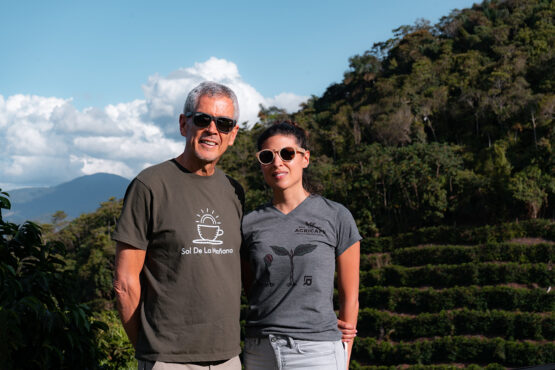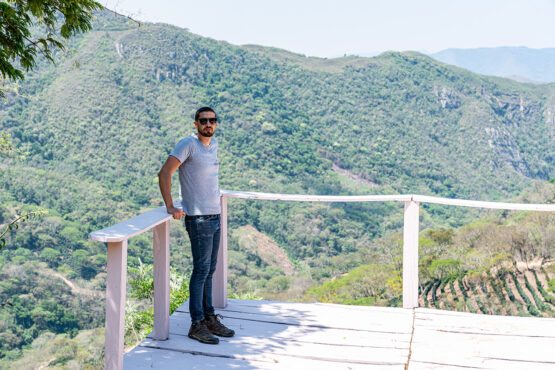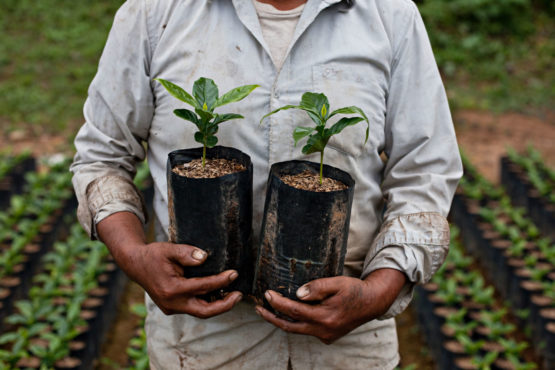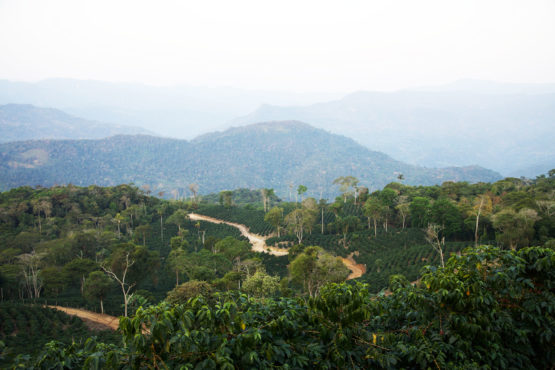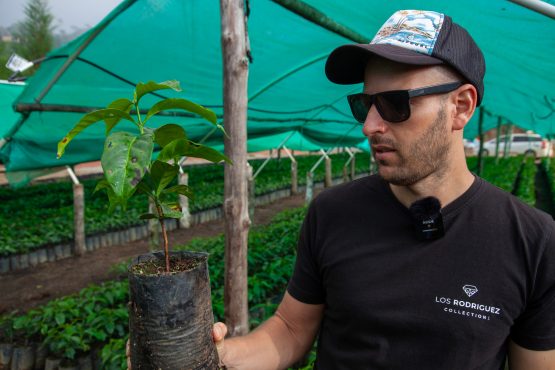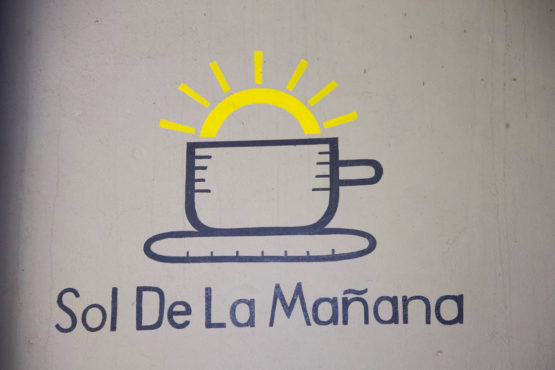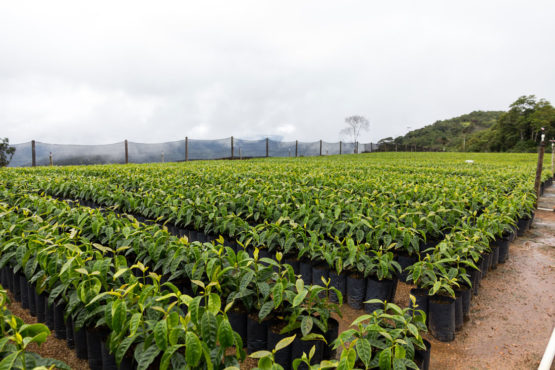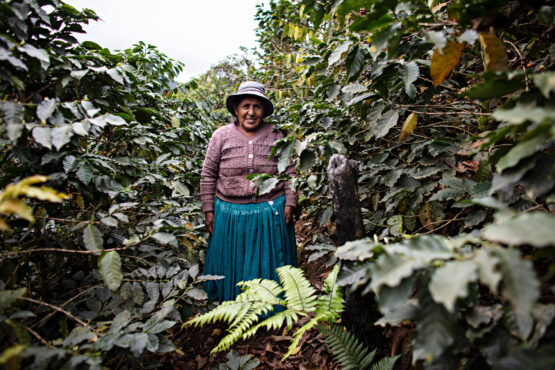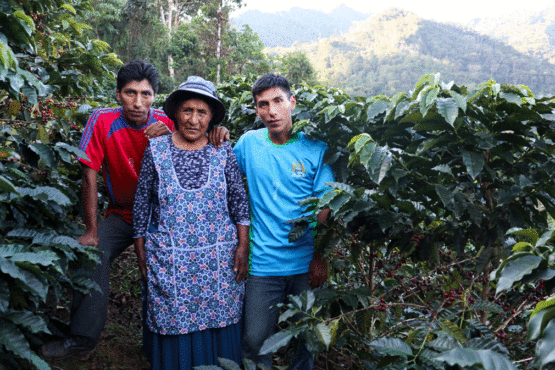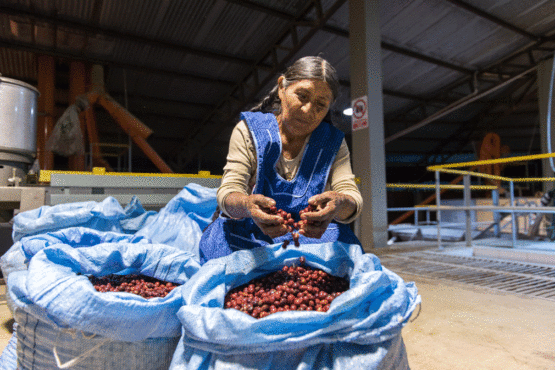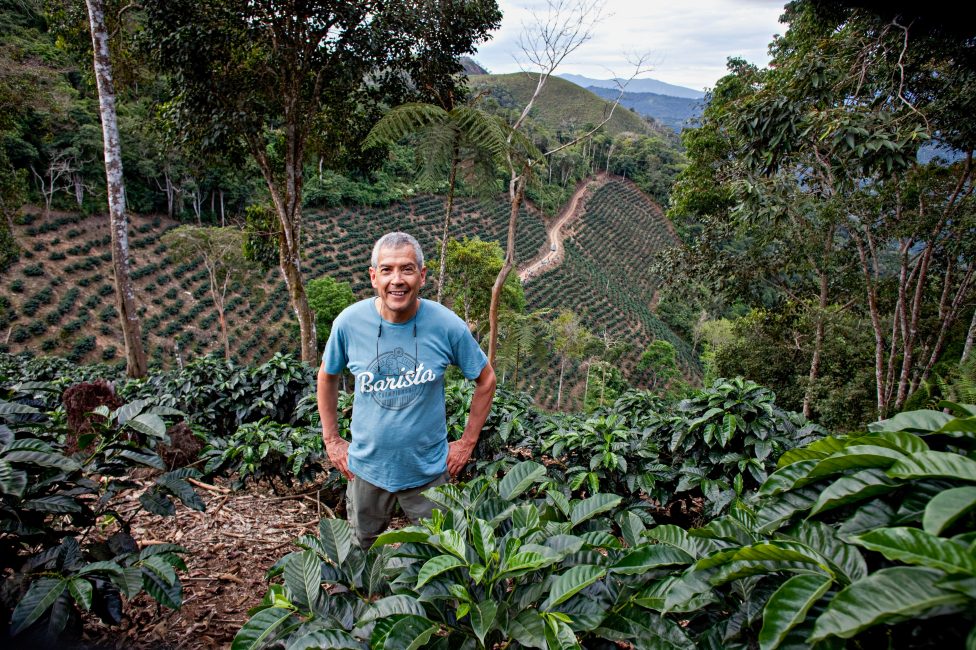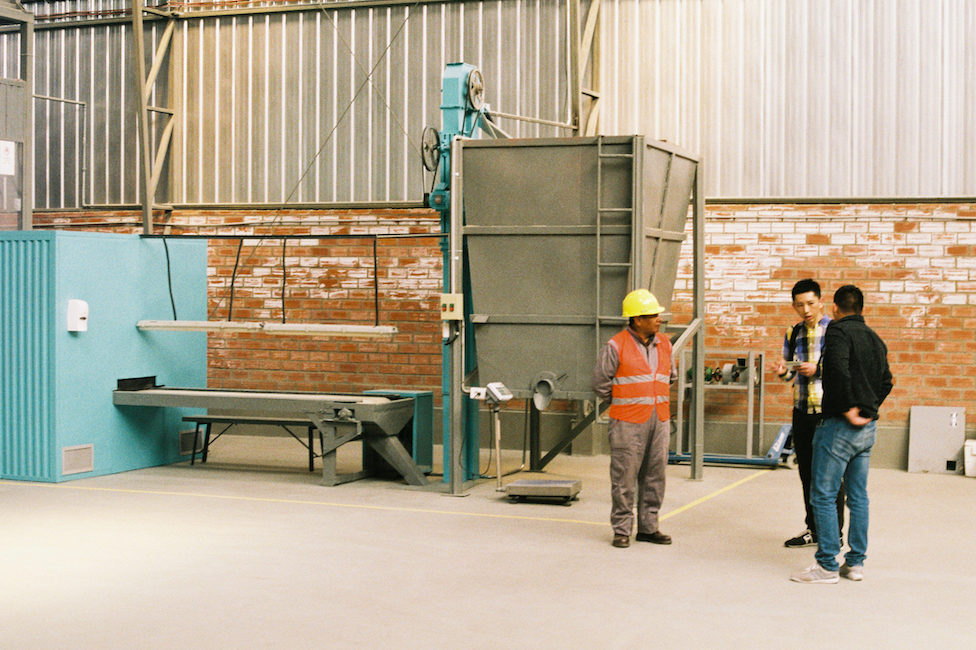Sol de la Mañana
The Sol de la Mañana initiative focuses on improving the production model for small holder farmers in Bolivia, with the goal of creating a more profitable and sustainable future for producing communities.
The Challenges of Growing Coffee in Bolivia
Producing coffee in Bolivia is incredibly difficult as it directly competes with the local coca industry – a plant that is easier to pick, harvests all year round and often yields higher profits for farmers. Unlike other coffee-producing countries like Colombia or Guatemala, Bolivia lacks a strong centralised body that heavily supports and promotes coffee production, further threatening the vitality of coffee trade in the country.
These factors, coupled with poor infrastructure, changing climate conditions, roya (leaf rust), and traditional, less sophisticated farming practices, have progressively led to a significant decline in production over the past decade. When we first started sourcing coffee from Bolivia in 2010, annual exports were around 70,000 bags (which, to put it in perspective, is equivalent to the annual output of one large farm in Brazil). Over the last decade this production has more than halved to a devastating 22,000 bags per annum in 2020.
The good news is that there is hope for the future of coffee in Bolivia, thanks to the vision, determination and hard work of Pedro, Daniela and Pedro Pablo Rodríguez who own the exporting company Agricafe, along with 12 farms collectively known as “Fincas Los Rodríguez.” The family have also established the Sol de la Mañana program, an initiative that is turning this downward trend around by teaching farmers more effective farming practices that contribute to a more profitable and sustainable future for coffee production in Bolivia.
Planning a Solution
Sol de la Mañana came about in 2014, after 10 local producers approached Pedro Pablo and asked for help. “We realized that we had a certain responsibility in not only managing our own farms, but also helping the producers that had been delivering coffee to us for many years. As a family, we saw the responsibility to work against this trend and save Bolivian coffee culture, because if we did not take it, Bolivian coffee would have slowly disappeared. We see this as a duty we owe to Bolivia.”
After much discussion, the Rodríguez family identified that the only way they could help producers and combat the country’s falling production was by finding a way to help increase the average producer’s yield:
When the program began, the average production of a single producer was 2.5 bags of green coffee per hectare. Given the average producer has 1-3 hectares of land, this meant they were only producing around 10 bags of coffee to survive.
To make a liveable income out of coffee production, farmers in Bolivia needed to be producing around 30 bags of coffee per hectare. The Rodríguez family decided to set up a curriculum that would tackle this problem head on, focusing on giving producers the skills and training they needed to their increase yields and improve the quality of their output.
When the program first started, most coffee farms were what the Rodríguez family would classify as ‘silvestre’ or ‘wild’. Pedro Pablo remembers, “It was common that the only time farmers entered the farm was for the harvest season. They didn’t understand that simply left alone, their plants would produce less or die.” One of the main goals of the program was to teach enrolled producers to take a more systematic and scientific approach to coffee farming, to help them increase their productivity and yields.
How the Program Works
The Sol de La Mañana program is set up as a ‘school for producers,’ starting with the basics. The curriculum focuses on one aspect of farming at a time and covers things such as how to build a nursery, how and when to use fertiliser, how to prune and how to selectively pick. “We require that the producers meet deadlines for each topic. Those who are unable to meet the deadlines are asked to re-join the program the following year. We have been intentionally strict as we want the group to learn the right way and to succeed and see the results” explains Pedro Pablo.
The Rodriguez family have also built a model farm and nursery at their Buena Vista mill, which is located in the producing region of Caranavi. The location of these is key, as it is close by to many of the enrolled producers. “We want to show the producers how to set up good practices right from the start. We show them how to select good seedlings and prepare and look after the soil and care for the trees.” Historically, most producers have not regularly pruned their trees, as they worry about the impact on yield. “We educate them about the importance of systematic pruning and show them how to do it.”
Using modern techniques learnt by Pedro Pablo while studying agriculture in Honduras, and with the assistance of international consultants, Agricafe introduced a level of expertise to coffee farming that was new to producers in the region. Initially, these new techniques raised some eyebrows among their neighbours, though they have since been won over by the program’s successes, “Some producers believed we were growing coca or had magic coffee beans as they had never seen coffee grow like this,” Pedro Pablo remembers.
Building trust has been crucial to Sol de la Mañana’s success. Initially, this was a tough ask, related Pedro Pablo, “In the beginning there was a lot of confusion, they didn’t believe us or trust us. Some members had been working in coffee farms for 30 – 40 years and we had only been producing coffee ourselves for a couple of years.” After taking the first steps to start their own nurseries and having tangible results, many producers changed their minds; “They were surprised and became very thankful and open to suggestions. They started to believe it was possible.”
Today, Pedro Pablo is assisted by two agronomists: Rodrigo Frigerio and Fabricio Bordón. The team members visit all of the members of the Sol de Mañana program every month and provide them with personalised technical assistance and agricultural advice. Even the simplest advice can go a long way. “We discovered some producers were not completely stripping their trees of coffee cherries at the end of harvest” Daniela explained. “This is very important and if you do not do it, you will dramatically reduce the following year’s productivity.”
Once a producer wants to enrol in the program, they get a visit from Agricafe, to see the state of their farm. They then work out a plan that tells them month-to-month, and even week-to-week, what activities they need to be doing. All members start with a nursery, which gets planted after their first harvest in the program, so that by year two, they have trees generating an income. Agricafe discourages producers from ripping everything up as they establish new practices; instead, members are advised to make the transition plot by plot. Year three is usually the first proper harvest, at which point, program members set up another nursery. Year four is when the trees are most productive — which also means, trees need the most nutrition once the harvest is completed. This is a real test for members, because if the large volumes become distracting, and they fail to feed their plantation properly, year five can be disastrous. Once a producer is established in the program, pruning rotations begin every year — but always in rotation to ensure cash continues to flow in steadily.
As participating producers have become more productive, Agricafe has stressed to them that they should continue to focus on quality rather than quantity. “We have seen farms go out of business by expanding too quickly, doubling or tripling the size of their land, using all of their resources and not being able to control the farm. We are teaching the producers to look after what they have and make the most of it. Then, once they feel comfortable, they can buy more land if they want”.
An issue that was identified via the program was that good quality fertilisers for nutrition were not readily accessible in the region. “We were teaching producers how and when to use fertilisers, but they would come back telling us that they didn’t work”. As it turned out, the only locally available fertiliser was a non-certified, poor-quality one. “We made the decision to buy and bring it into the region ourselves and sell it to the producers and local farmers at a 50% discounted price. The fertiliser was expensive, and many couldn’t afford it without the discount.” This important step required Agricafe to spend four months acquiring a licence to sell nutritional fertiliser, but Pedro Pablo says the results were worth it.
Agricafe also hosts workshops with leading agronomists throughout the year. These forums allow the producers to meet one another, share their experiences and discuss ways to tackle problems they are experiencing. Over time the producers have become more experienced and confident, and they now actively share what they have learned with each other.
The Results of the Program
In its first year of operation, Sol de La Mañana was made up of just 10 committed producers (including our long-time producing partners, the Mamani family). 2017 was the first official year of production for these producers, and they and Agricafe were delighted with the results. Cup quality increased, and producer yields doubled to around 20 bags a hectare.
Today, Sol de La Mañana has grown to support over 100 small holder producers in the Caranavi region. The program’s impact has been profound, and far beyond the Rodríguez family’s initial expectations. Production was up 200% in 2020, and the ripple effect of the familiy’s work is starting to be evident, as neighbouring farms have started to emulate the Sol de la Mañana producers’ farming techniques. The key to its success, according to Daniela, is that the producers feel empowered.
“We are giving them the tools and know-how, but they are actively choosing to follow our advice and invest in their farms. Now they can see the results, they trust us 100% and helping their neighbours achieve similar results.”
This is exactly what the Rodríguez family want and need the program to do. To scale the program up, they intend to train leading famers within each of the colonias (a group of small farms), with the intention that they will then share the knowledge they gain with the surrounding coffee community. As Pedro Pablo explains, this is where the program becomes really powerful: “At first, we did all the talking, but now the producers are much more proactive and engaged. They come to us with specific questions and share their results and what they have learnt with each other. This is the real success of the program, as it has given the control back to the producers.”
No one exemplifies the program’s success better than Carmela Aduviri, who we have been sourcing coffee from since 2018. Carmela has been a grower in the region for 50 years, all while raising eight children. She owns some three hectares of land in Caranavi and does not want any more, as she has realised that her land will be sufficiently profitable if she concentrates on quality procedures and maximises her yield. Two of her sons, Luis and Elvis, learned from working by her side and have taken on responsibilities at the farm, as part of a generational change the region is going through. A third son, Mauricio, has started establishing his own plantation after having worked with Carmela for the last few years. In 2021, the farm’s yields reached the point that Carmela and her sons no longer had the capacity to process their own cherry and had to deliver it to Agricafe’s Buena Vista mill instead. By 2023, Carmela was finally able to retire from working the fields, at the age of 74 — allowing her sons Luis and Elvis to manage operations by themselves.
The Sol de la Mañana program has required a huge investment of capital, time and resources from the Rodríguez family. But they genuinely believe in Bolivian coffee and care deeply about helping the producers they work with realise their potential and improve their lives. And we are right there with them. The coffee in Bolivia is way too special, spectacular and close to our hearts to let it disappear.
We want to be able to buy coffee from the same farmers every year, for many years to come. In the short term, this means paying higher prices to make it viable for our favourite producers to stay in coffee, as the building blocks are put in place to help them increase their yields and annual production. By demonstrating this commitment, we hope they will continue to invest in coffee production and maintain their focus on quality, so that, with time, a more sustainable and vibrant future is built for coffee in Bolivia.
